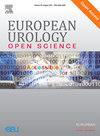FGFR3改变在不同阶段尿路上皮癌的临床和基因组景观
IF 3.2
3区 医学
Q1 UROLOGY & NEPHROLOGY
引用次数: 0
摘要
背景和目的我们的目的是全面分析潜在可靶向激活FGFR3改变的患病率及其对不同尿路上皮癌(UC)分期肿瘤预后的影响。方法回顾性分析1509例福尔马林固定石蜡包埋组织标本的临床资料和FGFR3结果。使用成熟的多重SNaPshot聚合酶链反应方法评估可激活的FGFR3突变。使用Qiagen Therascreen试剂盒进行FGFR3融合试验。在1509例患者中,202例(13%)为pTa期,380例(25%)为pT1期,258例(17%)为局限性肌肉浸润性膀胱癌(MIBC), 556例(37%)为局部晚期MIBC, 91例(6.0%)为膀胱转移性UC (mUCB), 22例(1.5%)为转移性上尿路UC (mUTUC)。在373例(25%)患者中检测到的FGFR3改变中,104例(52%)为pTa期,158例(42%)为pT1期,42例(16%)为局限性MIBC期,53例(9.5%)为局部晚期MIBC期,9例(9.9%)为mUCB期,7例(32%)为mUTUC期。FGFR3改变与总体人群中更好的无进展生存期和总生存期相关(p <;0.001),但在不同疾病分期的亚组分析中没有出现这种情况。研究的局限性包括回顾性设计和异质患者队列。结论和临床意义sfgfr3改变的发生频率与肿瘤分期有关,在较低的肿瘤分期中更为普遍。在调整肿瘤分期后,我们无法证明FGFR3改变对肿瘤预后的独立预后影响。我们分析了尿路癌症患者中一种叫做成纤维细胞生长因子受体3 (FGFR3)的蛋白质。我们发现,与侵袭性较低的肿瘤相比,侵袭性较强的肿瘤的FGFR3基因变化较少。然而,FGFR3基因的改变与这些患者的生存无关。本文章由计算机程序翻译,如有差异,请以英文原文为准。
Clinical and Genomic Landscape of FGFR3 Alterations Across Different Stages of Urothelial Cancer
Background and objective
Our aim was to provide a comprehensive analysis of the prevalence of potentially targetable activating FGFR3 alterations and their impact on oncological outcomes across different urothelial carcinoma (UC) stages.
Methods
We retrospectively analyzed clinical data and FGFR3 results for 1509 formalin-fixed, paraffin-embedded tissue specimens. Actionable activating FGFR3 mutations were assessed using a well-established multiplex SNaPshot polymerase chain reaction approach. FGFR3 fusion testing was performed with a Qiagen Therascreen kit.
Key findings and limitations
In the study population of 1509 patients, 202 (13%) had stage pTa, 380 (25%) had stage pT1, 258 (17%) had localized muscle-invasive bladder cancer (MIBC), 556 (37%) had locally advanced MIBC, 91 (6.0%) had metastatic UC of the bladder (mUCB), and 22 (1.5%) had metastatic upper tract UC (mUTUC). Of the FGFR3 alterations detected in 373 patients (25%), 104 (52%) were in stage pTa, 158 (42%) were in pT1, 42 (16%) were in localized MIBC, 53 (9.5%) were in locally advanced MIBC, nine (9.9%) were in mUCB, and seven (32%) were in mUTUC. FGFR3 alterations were associated with better progression-free survival and overall survival in the overall population (p < 0.001), but not in subgroup analyses for different disease stages. Study limitations include the retrospective design and heterogeneous patient cohort.
Conclusions and clinical implications
FGFR3 alterations occur at a stage-dependent frequency and are more prevalent in lower tumor stages. We were unable to demonstrate an independent prognostic effect of FGFR3 alterations on oncological outcomes after adjusting for tumor stage.
Patient summary
We analyzed a protein called fibroblast growth factor receptor 3 (FGFR3) in patients with cancer of the urinary tract. We found that more aggressive tumors had fewer genetic changes in FGFR3 in comparison to less aggressive tumors. However, genetic changes in FGFR3 were not related to survival for these patients.
求助全文
通过发布文献求助,成功后即可免费获取论文全文。
去求助
来源期刊

European Urology Open Science
UROLOGY & NEPHROLOGY-
CiteScore
3.40
自引率
4.00%
发文量
1183
审稿时长
49 days
 求助内容:
求助内容: 应助结果提醒方式:
应助结果提醒方式:


